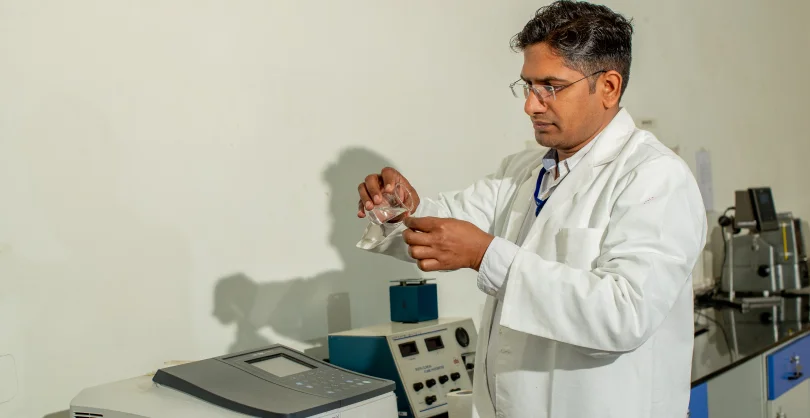OVERVIEW
The Master of Pharmacy (M.Pharm.) programme with a specialization in Pharmacology at K.R. Mangalam University offers an enriching and dynamic academic journey that empowers you with the knowledge and skills to become a leader in the pharmaceutical and healthcare industries.

Programme Highlights
The Master of Pharmacy (M.Pharm.) in Pharmacology at K.R. Mangalam University offers a curriculum focused on advanced pharmacological studies, drug action mechanisms, clinical pharmacology, and drug discovery processes. It integrates theoretical knowledge with practical research skills, emphasizing the study of drug interactions with biological systems. The programme also covers aspects of toxicology, biochemistry, and current pharmaceutical trends, preparing students for diverse roles in research, academia, and the pharmaceutical industry.
Programme Structure
- Modern Pharmaceutical Analytical Techniques
- Advanced Pharmacology-I
- Pharmacological and Toxicological Screening Methods-I
- Cellular & Molecular Pharmacology
- Experimental Pharmacology-I
- Seminar / Assignment
- Advanced Pharmacology II
- Pharmacological and Toxicological Screening Methods-II
- Principles of Drug Discovery
- Clinical Research & Pharmacovigilance
- Experimental Pharmacology - II
- Seminar/Assignment
- Research Methodology and Biostatistics
- Journal Club
- Discussion / Presentation (Proposal Presentation)
- Research Work
- Journal Club
- Research Work
- Discussion / Final Presentation
Connecting Talent to Dream Careers
At K.R. Mangalam University , we take great pride in our strong affiliations with esteemed pharmaceutical organizations, research institutions, and healthcare establishments. Our commitment to excellence is evident through our partnerships with leading pharmaceutical companies, research laboratories, and healthcare providers, including prominent names such as Biocon , INovozymes , Wockhardt , and many more.
Career Options
Our M.Pharm. in Pharmacology programme at K.R. Mangalam University serves as a gateway to a wide spectrum of rewarding career prospects at the intersection of pharmaceutical science and healthcare. Graduates of this programme emerge well-equipped with a unique blend of expertise and skills that are highly sought-after in various roles within the pharmaceutical and healthcare sectors. While there are numerous exciting avenues, we outline five key career paths below:
Programme
Outcomes
Possess the core and basic knowledge associated with the profession of pharmacy, including biomedical sciences; pharmaceutical sciences; behavioral, social, and administrative pharmacy sciences; regulatory and manufacturing practices
01
Demonstrate effective planning abilities including time management, resource management, delegation skills and organizational skills. Develop and implement plans and organize work to meet deadlines.
02
Honor personal values and apply ethical principles in professional and social contexts. Demonstrate behavior that recognizes cultural and personal variability in values, communication and lifestyles. Use ethical frameworks; apply ethical principles while making decisions and take responsibility for the outcomes associated with the decisions.
03
Utilize the principles of scientific enquiry, thinking analytically, clearly and critically, while solving problems and making decisions during daily practice. Find, analyze, evaluate and apply information systematically and shall make defensible decisions.
04
Apply reasoning informed by the contextual knowledge to assess societal, health, safety and legal issues and the consequent responsibilities relevant to the professional pharmacy practice.
05
Communicate effectively with the pharmacy community and with society at large, such as, being able to comprehend and write effective reports, make effective presentations and documentation, and give and receive clear instructions.
06
Understand, analyze and communicate the value of their professional roles in society (e.g. health care professionals, promoters of health, educators, managers, employers, employees).
07
Understand and consider the human reaction to change, motivation issues, leadership and team-building when planning changes required for fulfillment of practice, professional and societal responsibilities. Assume participatory roles as responsible citizens or leadership roles when appropriate to facilitate improvement in health and wellbeing.
08
Learn select, and apply appropriate methods and procedures, resources, and modern pharmacy-related computing tools with an understanding of the limitations.
09
Understand the impact of the professional pharmacy solutions in societal and environmental contexts, and demonstrate the knowledge of, and need for sustainable development.
10
Recognize the need for, and have the preparation and ability to engage in independent and life-long learning in the broadest context of technological change. Self-assess and use feedback effectively from others to identify learning needs and to satisfy these needs on an ongoing basis.
11
To produce pharmacy graduates with profound knowledge and high technical skills to meet various aspects in wide areas of Pharmaceutical industry.
01
Pharmacy graduates will be able to gain theoretical and practical knowledge in various subjects to discover novel formulation for the benefits of society.
02
Graduates will be able to become entrepreneur in Pharma sector with effective communication skill, teamwork and ethical attitude and high integrity for the betterment of society and community.
03
To promote and train the students towards contribution of health care system and patient counselling for prevention and treatment of diseases.
04
To encourage the students for lifelong learning process for and highly competent carrier prospect related to interdisciplinary pharmaceutical sciences.
05
To successfully apply fundamental principles of pharmaceutics in developing entrepreneurial expertise and solving formulation related problems.
01
To work competently in various areas of pharmaceutical industry and research.
02
To work effectively and ethically in their professional environment.
03
Seek constant improvement and develop new skills to enhance the state of their pharmaceutical practice.
04
To utilize the soft skills as a part of team in the professional endeavour.
05
To acquire knowledge and skills to work in various aspects of pharmaceutical Industries such as drug regulatory affairs, Analytical R&D, Medical writing
06
Financial Assistance
K.R. Mangalam University partnered with the leading banks to help you to finance your dream course through Education Loan. You only have to start repaying one year after finishing your course or six months after you get a job.
Frequently Asked Questions
Commence Your Journey
in 6 Simple Steps

Complete payment and submit
Pay the required Application Fee
Take an entrance test
K.R. Mangalam University Entrance Examination (KREE)
Appear for interaction
Attend our Faculty-Led Interview.
Get the admission offer
You will receive the offer letter after the successful interaction
Get Enrolled
Be prepared to embark on your journey














